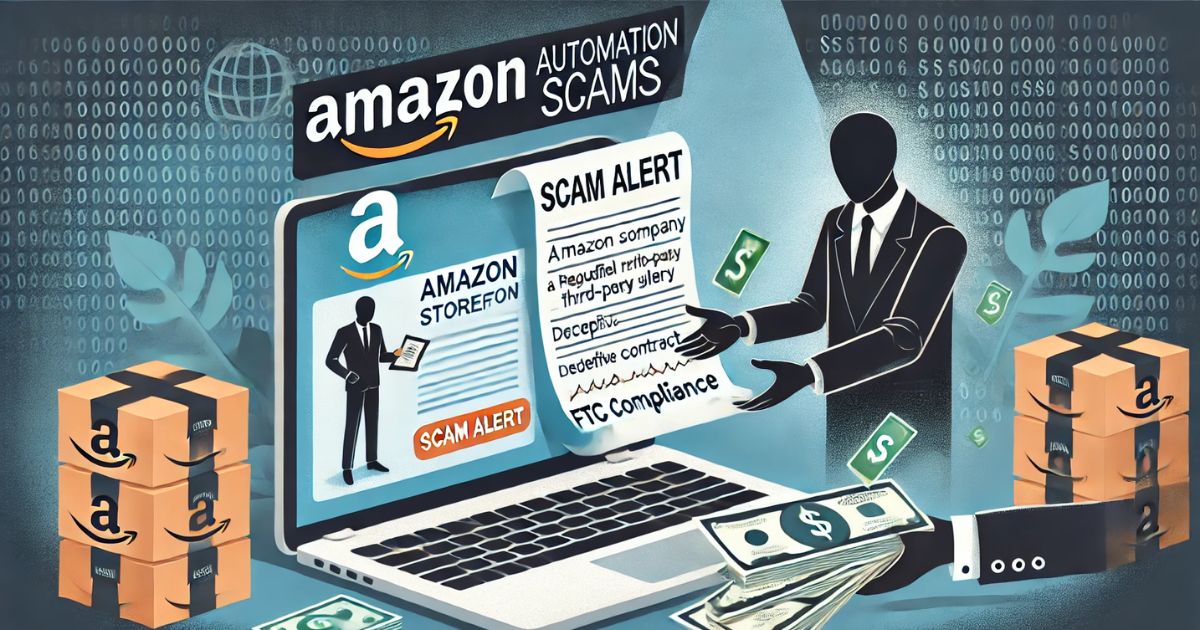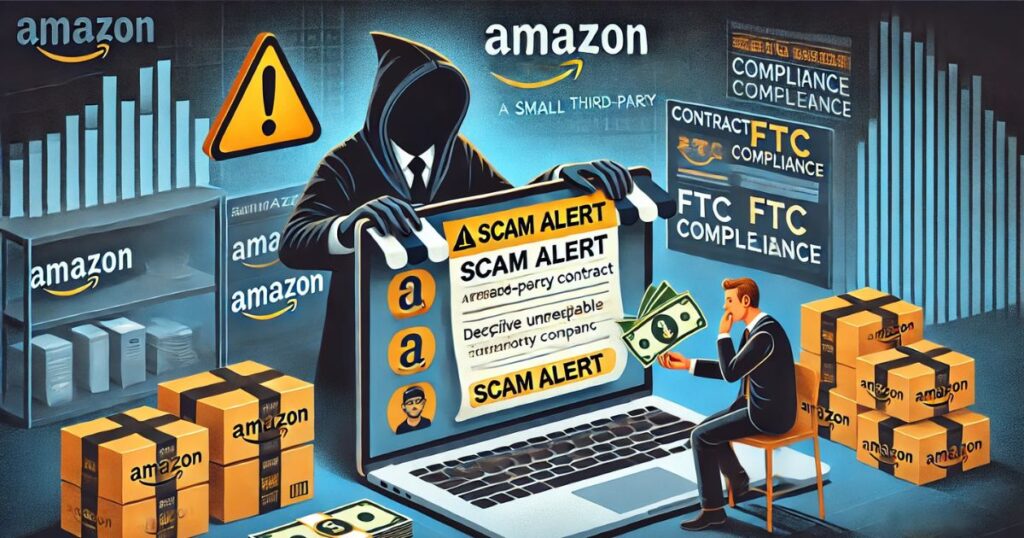
Amazon Automation is marketed as a hands-free way to run an Amazon business, promising passive income with minimal effort. Many third-party companies claim to handle everything for you—from product research & sourcing, and inventory management to order fulfillment and customer inquiries—allowing you to sit back and watch the profits roll in.
However, the reality is far different. While automation can help streamline specific repetitive tasks like automate pricing or using third-party tools for inventory management software, the idea of a completely hands-off eCommerce business is misleading (and virtually impossible). In many cases, Amazon automation services are scams, and the risks of partnering with such a company far outweigh the benefits.
What Is Amazon Automation?
Amazon automation services claim to take over the operations of your Amazon store. These companies promise to:
- Find and list profitable products through product research
- Obtain genuine goods through relationships with brands, distributors, or wholesalers
- Manage your inventory management software and handle order fulfillment
- Ship products to Amazon FBA facilities
- Respond to customer inquiries
- Use automation services to perform repetitive tasks like automate pricing
The business model seems attractive—after all, who wouldn’t want an online store that runs itself? But the reality is that these third-party automation companies often operate in direct violation of Amazon’s policies.
Why Amazon Automation Is Almost Always a Scam
The concept of Amazon automation contradicts Amazon’s strict seller policies. Amazon requires Amazon sellers to take full responsibility for their Amazon store, including product sourcing, inventory management, and customer inquiries. Automation services attempt to bypass these requirements, leading to potential account suspensions, destruction of FBA inventory, or confiscation of sales proceeds. Amazon automation companies also expose their clients to third-party claims for intellectual property infringement or tortious interference with contractual relations.
Additionally, many of these third-party companies:
- Do not comply with legal disclosure requirements
- Overpromise and underdeliver on order fulfillment and customer support
- Source inauthentic, counterfeit, stolen, or diverted goods
- Fail to obtain or provide sourcing documentation as required by Amazon’s policies
- Use third-party tools in ways that violate Amazon’s terms of service
- Fail to properly manage inventory management software, leading to stockouts or overselling
- Engage in risky selling practices that result in Amazon business shutdowns, destruction of FBA inventory, and confiscation of sales proceeds
The Risks of Amazon Automation Services
If you sign up for an Amazon automation service, you risk:
1. Financial Losses
Many sellers invest tens of thousands of dollars into automation services only to see little or no return. These companies claim to save money and save time, but the reality is that they often disappear once payment is made or after the Amazon Seller Account is deactivated by Amazon.
2. Legal Issues and FTC Compliance
The Federal Trade Commission’s Business Opportunity Rule requires businesses that sell money-making opportunities to provide clear disclosures about risks and earnings. However, most Amazon automation services do not comply with the FTC’s Business Opportunity Rule.
Over the last two years, the FTC has sued many third-party companies for fraud, misrepresentation, deceptive business practices, and failure to comply with the Business Opportunity Rule.
3. Amazon Account Suspension
Amazon has strict rules about using third-party tools and automation services. Amazon also maintains strict policies regarding product sourcing and authenticity. Many Amazon sellers who use Amazon automation unknowingly violate these policies, leading to their accounts being flagged or permanently banned. Most Amazon automation companies do not know or simply disregard Amazon’s policies regarding product sourcing or authenticity.
One-Sided Contracts: How These Services Trap Sellers
Most Amazon automation services require sellers to sign punitive and one-sided contracts that heavily favor the third-party automation company. These agreements often:
- Offer no refunds or legal protections
- Contain punitive and overly one-sided contract provisions such as limitations of liability and arbitration provisions that made dispute resolution cost-prohibitive
- Give the automation company full control over the Amazon store
- Lack transparency about how order fulfillment and inventory management will be handled
If you don’t have a lawyer review the contract before signing, you could be locked into a bad deal that drains your finances with no way out.
FTC Crackdown on Amazon Automation Scams

The FTC has started taking legal action against several Amazon automation services for deceptive marketing and failure to comply with the Business Opportunity Rule. Some common violations include:
- Making false earnings claims about Amazon business profits
- Not disclosing prior litigation against the Amazon automation company
- Not disclosing the risks of automation
- Failing to provide disclosure statements as required by law
If a company is offering a hands-free eCommerce business with guaranteed income, it’s likely too good to be true.
Real Horror Stories: What Can Go Wrong?
While we won’t name specific providers, there are countless horror stories of people who invested in Amazon automation services only to:
- Lose their entire investment
- Have their Amazon store permanently suspended
- Have their Amazon FBA inventory destroyed and their funds withheld
- Get sued by brand owners for intellectual property infringement or trafficking in counterfeit goods
- Discover that the third-party company vanished overnight and absconded with the initial sign-up fee
These scenarios happen more often than you think. Many Amazon sellers regret signing up for automation after realizing the risks too late.
Protect Yourself: Why You Need a Lawyer Before Signing Up
If you are considering Amazon automation services, it is crucial to have a lawyer review the service agreement before committing. A legal professional can:
- Identify unfair or unlawful contract provisions
- Ensure compliance with FTC regulations
- Ensure the automation service company’s proposed services comply with Amazon’s policies
- Protect your investment and help you save money
FAQs About Amazon Automation
Is Amazon Automation Legitimate?
While some automation services provide helpful third-party tools for inventory management and order fulfillment, many Amazon automation services are scams. They promise a passive Amazon business but often lead to account suspensions and severe financial loss.
Can You Automate an Amazon Store Without Violating Policies?
Yes, certain inventory management software, automate pricing tools, and API calls are allowed. However, completely outsourcing your Amazon store to a third-party company usually violates Amazon’s policies and can result in your account being suspended.
What Are Common Red Flags of an Amazon Automation Scam?
- Guaranteed passive income with little to no effort
- High upfront fees without a clear refund policy
- One-sided contracts that favor the automation provider
- No compliance with the FTC Business Opportunity Rule
- Disclaimers about complying with Amazon’s policies
- Broad limitation of liability provisions and arbitration provisions that make dispute resolution difficult and cost-prohibitive
Why Are Amazon Automation Companies Being Investigated by the FTC?
The FTC has cracked down on automation services that mislead Amazon sellers with false promises and violate the Business Opportunity Rule by failing to disclose financial risks.
How Can I Protect Myself Before Signing Up for an Amazon Automation Service?
Always:
- Read the proposed service agreement carefully (or better yet – have an attorney review it)
- Check if the company issues a disclosure statement as required by FTC regulations
- Look for legitimate customer reviews, not just testimonials on their site
- Look for prior litigation involving the Automation services provider
What Are Safer Alternatives to Amazon Automation?
Instead of relying on Amazon automation services, consider:
- Using inventory management software for inventory management
- Hiring a virtual assistant for customer inquiries
- Investing in third-party tools that comply with Amazon’s rules
Thinking About Amazon Automation? Get Legal Advice First
While automation services can help with certain repetitive tasks, a completely hands-free Amazon business is unrealistic and risky. Many third-party companies offering Amazon automation are operating on shaky legal ground, and sellers can end up losing their investments.
If you are thinking about signing up for an Amazon Automation service, have an experienced Amazon attorney look at the service agreement before you commit a large sum of money to such a venture.


